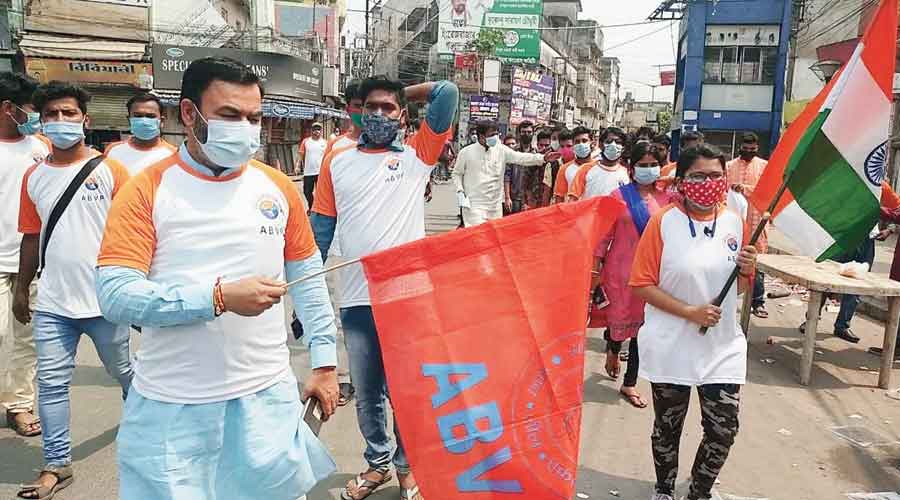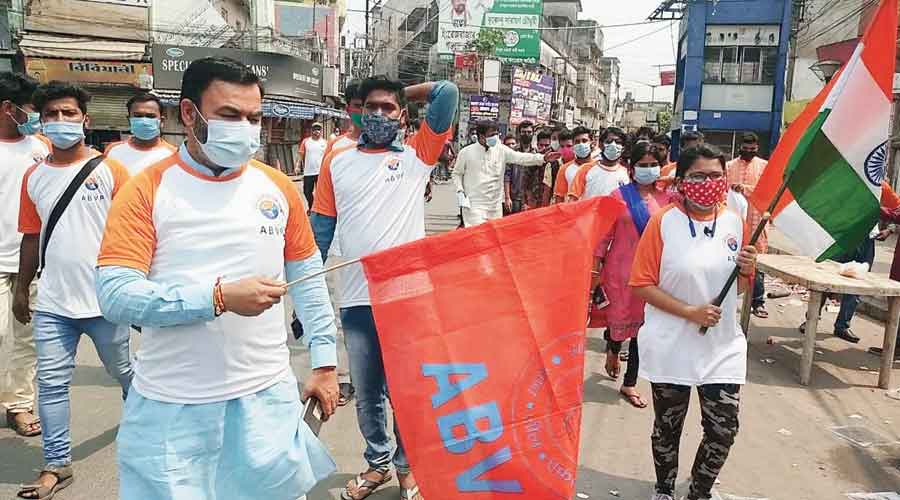An ABVP complaint has triggered a police notice to a central university in BJP-ruled Madhya Pradesh over a webinar on “scientific temper”, threatening a criminal case if any speaker with an “anti-national mindset” said anything to incite any class or community against another.
The Dr Harisingh Gour Vishwavidyalaya, Sagar, eventually pulled out as co-organiser of the two-day webinar, which began on Friday with the Montclair State University of the US as the sole organiser.
The webinar on “Cultural and linguistic hurdles in the achievement of scientific temper” was originally a joint venture by the central university’s anthropology department and Montclair.
On Thursday, Sagar superintendent of police Atul Singh wrote to the university’s vice-chancellor, Janak Dulari Ahi, saying the police had received “representations from certain groups” about the webinar.
“The speakers joining the webinar have in the past made anti-national mindset and caste-conflict related statements, and a suspicion has been raised that they may affect caste and social harmony with their comments on Indian culture, traditions, caste system and religious practices of the majority community,” the notice said.
“Hence, considering social harmony, a consensus should be arrived at before organising the webinar that the topics and thoughts that may be expressed in order that no religion, caste, region, community may feel offended by any parable/principle…. Despite this, if the campaign/ publication of any action of any speaker creates a situation whereby any class or community is incited against any other class community, the organisers will be considered collectively responsible for a punishable offence under Section 505 of the Indian Penal Code.”
The section deals with statements conducive to public mischief, including the promotion of enmity between classes and the incitement of an offence against the State, public tranquillity or a community.
Singh’s letter came a week after the ABVP, the student arm of the RSS, had complained to the VC that two of the proposed speakers were of an “anti-national mindset”.
They were Apoorvanand, who teaches Hindi at Delhi University, and Gauhar Raza, who retired as chief scientist from the National Institute of Science Communication and Information Resources, Delhi.
Raza and Apoorvanand spoke as scheduled when the webinar began on Friday with only the American university as the organiser.
Raza told The Telegraph: “I am pained not by the ABVP but the police resorting to Section 505 to stop a seminar on the scientific temper…. It feels like the inquisition against Galileo and the burning of Bruno in ancient Rome are being repeated in India today. I spoke on the killings of four rationalists in recent years.”
Apoorvanand told this newspaper: “We have seen this happen in Delhi University when discussions are stopped because some (people) object. The whole idea is to disrupt, so heads of departments are scared and don’t hold any programmes for fear of destruction to public property and violence.”
Swaraj Bir Singh, editor of the Punjabi Tribune newspaper and a former Meghalaya DGP who is not associated with the Sagar event, said later in response to a question: “Nobody can imagine this section being used for a seminar. It is used when someone incites violence, and is not used for seminars. When I served in Meghalaya, there were difficult situations but we never even thought of using such sections on seminars in a university.”
The complaint from ABVP district convener Shriram Richharia — which was sent also to the President, Prime Minister and chief minister — warned of taking legal action against the vice-chancellor and other officials and shutting down the university if the two speakers were allowed to participate. Richharia also complained to Singh on Thursday.
Asked about the grounds for the notice, Singh told The Telegraph: “I have cited only objections raised by persons and groups…. The police have various sources of information and intelligence.”
On Thursday, the university wrote to the webinar’s convener, anthropology professor Rajesh K. Gautam, that the webinar and the participants needed approval from the Union education ministry under new regulations introduced in January this year and asked him to initiate the process.
Gautam was warned that he alone would be liable for the consequences if he went ahead without approval. In another letter to Gautam on Friday, the university asked him to postpone the webinar if permission was not received.
Registrar Santosh Shagora added in the letter: “Moreover, as you are the convener of the online webinar, you and your entire team are responsible for the whole event. University platform (Online/ IT/ Offline or any other kind) and University name, logo, etc, shall not be used for the purpose of this Online Webinar.”
Ahi and Shagora did not respond to queries from this newspaper.
On Friday evening, Gautam and an anthropology colleague, K.K.N. Sharma, filed complaints of assault against each other.
Sharma accused Gautam of assaulting him when he tried to enforce the vice-chancellor’s order to prevent the viewing of the webinar from a seminar room at the university.
Gautam, a Dalit, accused Sharma of assaulting him with a sharp object in the toilet, and of ill-treating him because of his caste in the past as well.
Singh said that preliminary investigations were on.
The other speakers included Lucknow University’s Nadeem Hasnain, IIIT Hyderabad professor Harjinder Singh, GLA University (Mathura) professor Panchanan Mohanty, Grazyna Liczbinska from Poland, Aseem Hasnain from Bridgewater State University in the US, and Georgetown University professor Gaurav J. Pathania.













